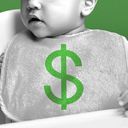Child care benefits for workers effectively pay for themselves, new study finds

The cost of providing child care benefits to employees — like stipends and onsite day care — is an investment with outsized returns, finds an intriguing new study from Boston Consulting Group (BCG) and nonprofit Moms First.
Why it matters: The increasing cost of child care in the U.S., along with a shortage of providers, keeps parents out of the workforce — a drag on the economy overall and a hit to employers in a tight labor market.
The big picture: These benefits are gaining more attention, particularly in the wake of the pullback of pandemic-era child care funding — but they're still pretty rare.
- 12% of workers in the U.S. have access to child care benefits from an employer — a number that falls to 6% for part-timers and those in the lowest income quartile, per BCG.
- Yet those are the workers who typically lose out on pay because of a child care emergency.
What they found: For every $1 spent on child care benefits, employers saw a net gain of between $0.90 and $4.25 through reduced absenteeism, less lateness, and lower rates of attrition.
- The study debunks the idea that child care is a cost center. "These benefits pay for themselves," the authors write.
Zoom in: Researchers looked at five companies of varying sizes, across a range of sectors, employing both salaried and hourly workers.
- UPS: The shipper piloted an onsite emergency daycare for hourly workers at a warehouse in Northern California. In place for three months, the benefit led to three fewer employee absences a day, according to UPS data. It plans on expanding this to eight more sites by year's end.
- Etsy: The e-commerce company offers $4,000 for backup childcare and a $1,000 annual work-life stipend. 79% of employees there said they're more likely to stay with the company because of these benefits.
- Steamboat: The Colorado ski resort, started a child care center — with funding from the state — in the wake of the pandemic. Employees, who pay a subsidized rate, reported an average of 13 avoided absences per year.
- Fast Retailing: The global company that operates Uniqlo and Theory, gives a monthly $1,000 child care stipend to hourly management track employees — these folks avoided 11 absences a year on average.
Reality check: This is a limited study, conducted in part by a group that advocates for these types of benefits. More research needs to be done.